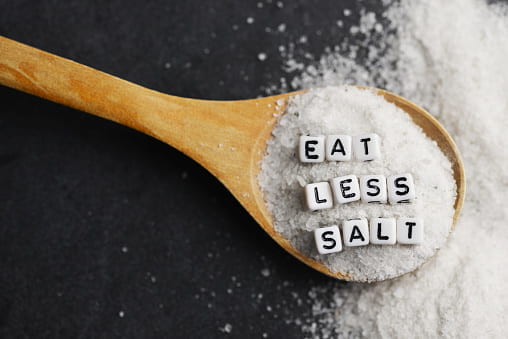As of June 1, 2016, the Food and Drug Administration (FDA) introduced drafted guidelines for voluntary sodium-reduction targets in an effort to gradually reduce the amount of sodium across a range of restaurant and manufactured foods.
Currently, the average American consumes 3,400 mg or about 11⁄2 teaspoons of salt per day. The FDA hopes to reduce that number to 2,300 mg per day or a half-teaspoon of salt. The goal for people with high blood pressure or hypertension is 1,500 mg per day or a quarter teaspoon of salt.
According to the FDA, about 75% of our daily intake of salt comes from processed and prepared foods like bread, cereal, cold cuts and condiments. The FDA is setting targets to reduce sodium in about 150 categories of processed and prepared food over the next decade.
The effect of too much sodium in one’s diet can be devastating to his or her health. A diet high in salt can lead to hypertension, which can result in heart disease, stroke, heart failure and kidney disease.
Quick Tips
- Eat food naturally low in sodium like fresh fruits and vegetables, frozen fruits and vegetables (without sauce), canned fruits and vegetables (with no added salt), rice, pasta, unsalted nuts, and dried fruit.
- Try to purchase unsalted products whenever possible.
- Read food labels and take note of the serving size of each product.
- Instead of flavoring your food with salt, try using herbs, garlic, pepper, and other spices.
Sources:
Aubrey, A. (2016, June 01). FDA Guidelines Target the Sodium Hiding In Our Diets. Retrieved June 03, 2016, from http://www.npr.org/sections/thesalt/2016/06/01/48030 272/fda-guidelines-target-the-sodium-hiding-in-our-diets
Center for Science in the Public Interest. (2016, June 01). FDA Issues Voluntary Sodium Reduction Targets. Retrieved June 03, 2016, from http://cspinet.org/new/201606011.html
U.S. National Library of Medicine. (2016, June 01). FDA Calls for Less Salt in Processed Foods. Retrieved June 03, 2016, from https://www.nlm.nih.gov/medlineplus/news/fullstory_159136.html
Linda Altenburger, Senior Nutritionist, SNAP-Ed
